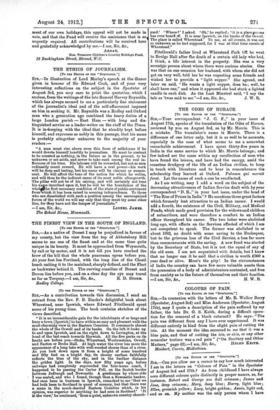THE ETHICS OF JOURNALISM.
[TO THE EDITOR OP TEE " SPECTATOR."]
SIR,—In illustration of Lord Morley's speech at the dinner given in honour of Sir Edward Cook, and of your very
interesting reflections on the subject in the Spectator of August 3rd, you may care to print the quotation, which I enclose, from the writings of the late Samuel Harvey Reynolds, which has always seemed to me a particularly fine statement of the journalist's ideal and of the self-effacement imposed on him in seeking it. Mr. Reynolds was a Radley and Oxford man who a generation ago combined the heavy duties of a large London parish — East Ham — with long and dis- tinguished service as a leader-writer on the staff of the Times.
It is in.keeping with the ideal that he steadily kept before himself, and expresses so nobly in this passage, that his name is probably altogether unknown to the majority of your readers :-
"A man must rise above even this form of selfishness if he would devote himself heartily to journalism. He must be content to be counted as nothing, in the future as in the present, to be unknown or set aside, and never to take rank among the real in- fluences of his time. His labours will be rewarded, but not as men ordinarily count reward. He will have a real power—his work will be deep and lasting, but his name will be obscure or evanes- cent. He will affect the tone of the nation for which he writes, and will thus be the indirect cause of its most noble aftergrowth. The pillar will not be of his raising, and will certainly not bear his lfe inscribed upon it, but he will be the foundation of the who he first necessary condition of the state of public sentiment from 'which it has been raised in seeming independence. To those who are dissatisfied with such a position among the unrecognized forces of the world we will say only that they must try some other line, for they have not the temper of journalists."
—I am, Sir, &c., LIONEL JAMES.
The School House, Monmouth.


































 Previous page
Previous page